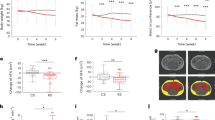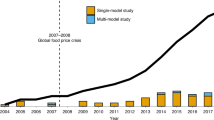Abstract
Objective:
This pilot study tested whether maternal feeding attitudes and styles towards children are part of the ‘shared’ or ‘non-shared’ home environment. A secondary aim was to test whether within-family differences in maternal feeding attitudes and styles relate to within-family differences in child weight status.
Methods:
Mothers of 3- to 7-year-old sibling pairs (N=15 pairs) completed the Child Feeding Questionnaire (CFQ), which assessed feeding attitudes (perceived responsibility, perceived child overweight and child weight concern) and feeding styles (monitoring, restriction and pressure to eat) towards children. Mothers rated each sibling separately. Child weight and height were measured and converted to body mass index (BMI) z-scores. Intraclass correlations tested the familial associations for each CFQ subscale. Pearson's correlations tested whether within-family differences in CFQ subscales were related to within-family differences in child BMI z-scores.
Results:
Perceived responsibility (ρ=0.77, P=0.0004), perceived child overweight (ρ=0.99, P<0.0001) and monitoring (ρ=0.57, P=0.01) showed significant familial correlations. Mothers reported significantly greater weight concern (r=0.85, P=0.02) and reduced pressure to eat (r=−0.80, P=0.03) towards heavier than thinner children within families.
Conclusion:
Whether or not maternal feeding practices are shared or non-shared components of the home environment depends on the specific feeding domain being measured. Restrictive feeding practices and encouragements to eat by mothers might be tested as non-shared environmental variables in genetics studies of childhood obesity.
This is a preview of subscription content, access via your institution
Access options
Subscribe to this journal
Receive 12 print issues and online access
$259.00 per year
only $21.58 per issue
Buy this article
- Purchase on Springer Link
- Instant access to full article PDF
Prices may be subject to local taxes which are calculated during checkout
Similar content being viewed by others
References
Faith MS, Keller KL . Genetic and environmental architecture of human ingestive behavior. Nutrition 2003; 20: 127–133.
Grilo CM, Pogue-Grile MF . The nature of environmental influences on weight and obesity: a behavior genetic analysis. Psych Bull 1991; 110: 520–537.
Birch LL, Fisher JO . Development of eating behaviors among children and adolescents. Pediatrics 1998; 101: 539–549.
Johnson SL, Birch LL . Parents' and children's adiposity and eating style. Pediatrics 1994; 94: 653–661.
Fisher JO, Birch LL . Eating in the absence of hunger and overweight in girls from 5 to 7 y of age. Am J Clin Nut 2002; 76: 226–231.
Birch LL, Fisher JO, Davison KK . Learning to overeat: maternal use of restrictive feeding practices promotes girls' eating in the absence of hunger. Am J Clin Nutr 2003; 78: 215–220.
Baughcum AE, Powers MS, Scott W, Johnson SB, Chamberlin LA, Deeks CM et al. Maternal feeding practices and beliefs and their relationships to overweight in early childhood. J Dev Behav Pediatr 2002; 22: 391–408.
Wardle J, Sanderson S, Guthrie CA, Rapoport L, Plomin R . Parental feeding style and the intergenerational transmission of obesity risk. Obes Res 2002; 10: 453–462.
Faith MS, Tepper BJ, Hoffman DJ, Pietrobelli A . Genetic and environmental influences on childhood obesity. Clin Fam Prac 2002; 4: 277–294.
Saelens BE, Ernst MM, Epstein LH . Maternal child feeding practices and obesity: a discordant sibling analysis. Int J Eat Disord 2000; 27: 459–463.
Birch LL, Fisher JO, Grimm-Thomas K, Markey CN, Sawyer R, Johnson SL . Confirmatory factor analysis of the Child Feeding Questionnaire: a measure of parental attitudes, beliefs, and practices about child feeding and obesity proneness. Appetite 2001; 36: 201–210.
Spruijt-Metz D, Lindquist CH, Birch LL, Fisher JO, Goran MI . Relation between mothers' child-feeding practices and children's adiposity. Am J Clin Nutr 2002; 75: 581–586.
Francis LA, Hofer SM, Birch LL . Predictors of maternal and child-feeding style: maternal and child characteristics. Appetite 2001; 37: 231–243.
Faith MS, Keller KL, Johnson SL, Pietrobelli A, Matz PE, Must S et al. Familial aggregation of energy intake in children. Am J Clin Nutr 2004; 79: 844–850.
Kuczmarski RJ, Ogden CL, Guo SS, Grummer-Strawn LM, Flegal KM, Mei Z et al. 2000 CDC growth charts for the United States: methods and development. Vital & Health Statistics Series 11: Data from the National Health Survey, vol. 246, No. 1, 2002, pp 1–190.
Shrout PE, Fleiss JL . Intraclass correlations: uses in assessing rater reliability. Psychol Bull 1979; 86: 420–428.
Bruch H . Developmental considerations of anorexia nervosa and obesity. Can J Psychiat 1981; 26: 212–217.
Faith MS, Goldstein R, Pietrobelli A . Defining obesity and weight disturbance in children: researchers, health professionals, and parents. Pediatr Nutr 2002; 4: 14–17.
Baughcum AE, Chamberlin LA, Deeks CM, Powers SW, Whitaker RC . Maternal perceptions of overweight preschool children. Pediatrics 2000; 106: 1380–1386.
Jain A, Sherman SN, Chamberlin LA, Carter Y, Powers SW, Whitaker RC . Why don’t low-income mothers worry about their preschoolers being overweight? Pediatrics 2002; 107: 1138–1146.
Dunn J, Plomin R . Separate Lives: Why Siblings are so Different. Basic Books: New York, 1990.
Costanzo PR, Woody EZ . Domain-specific parenting styles and their impact on the child's development of particular deviance: the example of obesity proneness. J Soc Clin Psychol 1985; 3: 425–445.
Dietz WH, Mei Z . Is failure to thrive a greater concern than obesity. J Pediatr 2002; 141: 6–7.
Cohen J . Statistical Power Analysis for the Behavioral Sciences, revised edition. Academic Press: New York, 1977.
Maes HH, Neale MC, Eaves LJ . Genetic and environmental factors in relative body weight and human adiposity. Behav Genet 1997; 27: 325–351.
Birch LL, Zimmerman SI, Hind H . The influence of social-affective context on the formation of children's food preferences. Child Dev 1980; 51: 856–861.
Faith MS, Heshka S, Keller KL, Sherry B, Matz PE, Pietrobelli A et al. Maternal–child feeding patterns and child body weight: findings from a population-based sample. Arch Ped Adol Med 2003; 157: 926–932.
Acknowledgements
This research was supported by NIH Grant K08MH01530 (MSF) and by a Pilot and Feasibility Grant awarded from the New York Obesity Research Center.
Author information
Authors and Affiliations
Corresponding author
Rights and permissions
About this article
Cite this article
Keller, K., Pietrobelli, A., Johnson, S. et al. Maternal restriction of children's eating and encouragements to eat as the ‘non-shared environment’: a pilot study using the child feeding questionnaire. Int J Obes 30, 1670–1675 (2006). https://doi.org/10.1038/sj.ijo.0803318
Received:
Revised:
Accepted:
Published:
Issue Date:
DOI: https://doi.org/10.1038/sj.ijo.0803318
Keywords
This article is cited by
-
Disturbed families or families disturbed: a reconsideration
Eating and Weight Disorders - Studies on Anorexia, Bulimia and Obesity (2022)
-
About feeding children: factor structure and internal reliability of a survey to assess mealtime strategies and beliefs of early childhood education teachers
International Journal of Behavioral Nutrition and Physical Activity (2018)
-
Friends and social contexts as unshared environments: a discordant sibling analysis of obesity- and health-related behaviors in young adolescents
International Journal of Obesity (2017)
-
Clustering of diet- and activity-related parenting practices: cross-sectional findings of the INPACT study
International Journal of Behavioral Nutrition and Physical Activity (2013)
-
A twin study of self-regulatory eating in early childhood: estimates of genetic and environmental influence, and measurement considerations
International Journal of Obesity (2012)



